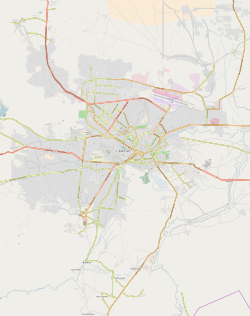Bombing
On 27 January 2018, insurgents blew up an explosives-packed ambulance near an interior ministry building on a busy and heavily-guarded street in the Afghan capital Kabul during rush hour. [4] [2] The bombers detonated the explosives while passing through the second in a series of checkpoints near Kabul's embassies and government buildings including the European Union embassies. The explosion was so powerful that the shock was felt around the capital, collapsing buildings and destroying façades in the immediate area. [1] The Jamhuriat Hospital, government offices, businesses and a school are close to the site of the blast. [5] It was the third major attack in seven days, following shootings at an aid agency in Jalalabad, Nangarhar Province, and at the Inter-Continental Hotel in Kabul. [6] Officials confirmed that the bomb was hidden in the ambulance and detonated at a second police checkpoint. [7] Its blast also destroyed vehicles, shops, and buildings nearby. [8] [9]
The attack occurred on a street, locally known as Chicken Street, near a building run by the Interior Ministry. Various government agencies have offices there and the road had security checkpoints in place. The coordinator for the Italian aid group Emergency that operates a trauma center described the event as a "massacre". According to reports, the vehicle was stopped at a second security checkpoint after passing the primary one claiming they had a patient. When police attempted to stop the vehicle from going further, the driver detonated the bomb. Relatives were reported to be queuing at the city morgue. [2] The scene of the attack was described as one of carnage with shattered bodies, many unidentifiable, lying all over. [10]
Perpetrators
The Taliban claimed responsibility for the attack. [2] The Afghan government described it as a crime against humanity, and accused Pakistan of providing support to the attackers. Pakistan denies supporting militants carrying out attacks in Afghanistan. [11]
This page is based on this
Wikipedia article Text is available under the
CC BY-SA 4.0 license; additional terms may apply.
Images, videos and audio are available under their respective licenses.

